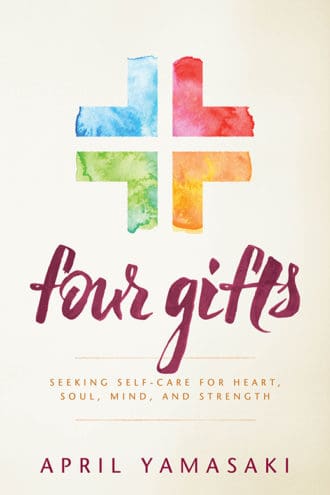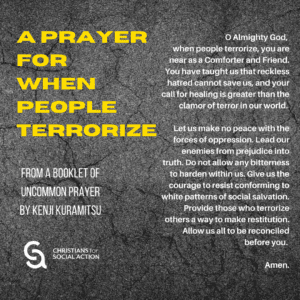
When a friend asked me recently about my next book, I replied rather sheepishly, “Well, it’s supposed to be on self-care—ironic, I know, since I need to take better care of myself these days.”
“That’s often how it is with those in the helping professions,” he said. As a social worker and counselor, he could identify with my dilemma. “We’re not always good at taking our own advice.”
Part of my struggle is simply being human. We don’t always do what we know to be good and true for us. As the apostle Paul wrote long ago about his own inner conflict, “I do not understand my own actions” (Romans 7:15). The good that he wanted to do, he did not do. And the bad that he wanted to avoid, he ended up doing. That sounds a lot like me and self-care—not eating right even though I want to, and staying up too late even though I don’t want to.
But my struggle with self-care runs even deeper.
Isn’t self-care selfish?
In a world in which many don’t have enough to eat, do I really need to treat myself to all-you-can-eat sushi, even if it’s only once in a while? Do I need that scoop of chocoholic ice cream, even if it’s only one and I haven’t had any dairy in days, and skip the cone please, I’ll just have it in a dish? And why does my supposed self-care so often take the form of food, anyway?
Throughout my childhood, most of my summer vacations were spent at home with long, lazy days of reading library books, playing badminton in the backyard, and roaming the neighborhood with my friends. Today we’d call that a “staycation,” as if it’s somehow unusual to stay at home instead of driving down the coast or flying to Hawaii; as if vacationing at home couldn’t be a real vacation.
But what of those who live on the edge of just meeting their expenses, who can’t afford to travel? Or those who have been displaced by famine, oppression, or violence, and who long for home—dreaming not of vacation, but of being able to stay in one place? For many in my community and around the world, there is no such thing as a vacation away from home or even a staycation at home. So why do I somehow need to get away in the name of good self-care?
In light of human needs at home and around the world and all the many displaced and suffering people, in light of environmental concerns and the continuing strain on the planet, isn’t my concern for self-care rather selfish?
The limits of self-care
What’s more, much of the popular self-care advice I read seems to add to my burden instead of lifting it, for now I must make time to go cloud watching, start a compliments diary, declutter my closets, or tack on some other self-care activity. Somehow, simplifying my life turns out to be more complicated than I’d hoped. Instead of relieving my already too-long to-do list, self-care becomes just one more thing to do. On top of that, I sense the unspoken assumption—if not imposed by others, then perhaps of my own making—that if I could only practice better self-care, if I could ever finally do it right, then all would be well. I’d be happier and healthier. I’d finally be able to take care of everyone and everything.
I sense the unspoken assumption—if not imposed by others, then perhaps of my own making—that if I could only practice better self-care, if I could ever finally do it right, then all would be well. I’d be happier and healthier. I’d finally be able to take care of everyone and everything.
But that’s not the way life works. I’m human and limited, and you are, too. There are only so many hours in a day, and only so much get-up-and-go before it’s gone. Although we are human beings with considerable energy and creativity, we remain finite creatures with finite energies and finite time. We can’t take care of everyone and everything on our own, no matter how much we practice self-care or how good we get at it.
The bigger picture is that we don’t have to—for we have a God who cares for us. Instead of focusing narrowly on caring for myself, I can cast all my cares on God, who cares for me and who cares for all of us. As 1 Peter 5:10 reminds us, God longs to “restore, support, strengthen, and establish” us. Surprise, surprise! Everyone—and everything—does not depend on me, and that includes my own self-care. Instead of the self-sufficiency of self-care, I can depend on the all-sufficiency of God’s care.
At the same time, I find myself challenged by the teaching and example of Jesus, for in the course of his public ministry, Jesus issued a clear call to commitment and self-denial.
Jesus and the opposite of self-care
“If any want to become my followers, let them deny themselves and take up their cross and follow me,” said Jesus. “For those who want to save their life will lose it, and those who lose their life for my sake, and for the sake of gospel, will save it” (Mark 8:34-35).
Isn’t that the opposite of self-care? If Jesus cared about self-care, would he have allowed himself to be arrested, brutalized, and put to death on a cross? If Jesus’ first followers thought about self-care, would those men and women have left their homes and livelihoods to follow him around the countryside? Would the apostle Paul have suffered flogging, stoning, shipwreck, and other hardships, only to keep on preaching and suffering for the sake of the gospel?
Instead of caring for themselves, those who followed Jesus denied themselves and found a new way of life in God’s kingdom. They served with such wholehearted abandon that I suspect our twenty-first-century North American concern for self-care would have made no sense to them.
For all these reasons, I find myself still seeking self-care: because I know I need self-care, yet can’t always get there; because I’m tired of seeing self-care as just one more thing to do; and because I need a bigger vision of caring for myself that also embraces caring for others and surrendering myself to God’s call and care.
April Yamasaki is a pastor, speaker, and writer on spiritual growth and Christian living. She is the author of Sacred Pauses, and her work has appeared in the Christian Century, Canadian Mennonite, and other venues. A member of Redbud Writers Guild, she has more than twenty years of experience as a congregational pastor and leads workshops and Bible studies in denominational and other settings. She and her husband live in British Columbia. This excerpt is taken from Four Gifts: Seeking Self-Care for Heart, Soul, Mind, and Strength (Herald Press, 2018), all rights reserved. Used with permission.


